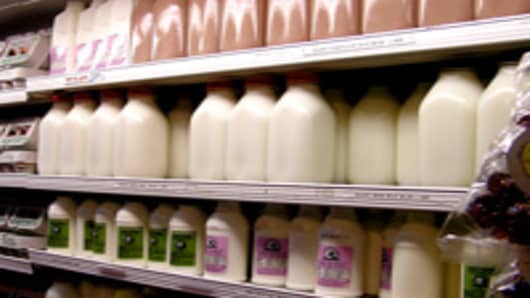For many generations, the average consumer woke up every morning and reached for their favorite cereal, let's say, Kellogg’sFrosted Flakes.
Later, they lunched on a sandwich of Skippy peanut butter and Smuckersjam on Wonder Bread. Then they washed their hands with Dial and rinsed their mouths with Listerine.
No more.
Today, consumers don't always reach for a brand-name. Private-label, or store-brand, grocery items have become increasingly popular across many product categories, and the trend is not likely to diminish in the future, according to Bill Pecoriello, president of Consumer Edge Research.
But that doesn't mean all categories of consumer products will be affected in the same way.
After surveying more than 2,500 households, Pecoriello rated 90 categories of grocery products based on the likelihood of consumers to continue to prefer the private-label versions as the economy improves. Milk, cooking oil, bleach, paper napkins and spices were the most popular private-label items. Peanut butter, cereal and bottled water were also at the top of the “high risk” category for private-label penetration, based on Pecoriello's research.
This study reinforced Pecoriello's expectation that sales of store brands will continue to rise over time, he said. What's more, economic downturns, like the latest recession, are not the primary factor driving the trend, he said. Instead, it is that increasingly value-conscious consumers are recognizing a good deal when they see one, and they are happy with the quality of today's store-branded products.
“There are high levels of satisfaction when trading down to private labels from brand names. The performance is pretty good here,” he said.
In addition, private-label growth isn't being driven by consumers who are struggling. According to a Nielsen study, it's households making more than $100,000 a year that are the fastest-growing segment of the trend.
While that bodes well for the future of private labels, it's important to recognize which consumer packaged good companies will be most pressured by the increased competition.
According to Pecoriello, Dean Foods, the nation's largest dairy company by revenue, ranked at the top.
The impact of private-label's encroachment has already left its mark on Dean. The company's shares have fallen sharply since the company reported a 43 percent decline in first-quarter profit earlier this month, citing market share gains of store-branded milk for its disappointing results.
According to Dean's CEO, private-label competition is making it difficult for the company to raise prices and improve its profitability.
Other companies are also at risk, according to Pecoriello. He cited spice company McCormick, and food giants like Kraft, Kellogg's and Campbell Soup as examples.
Pecoriello isn't alone in his assumption that private-label brands will hold onto their gains as the economy improves.
Major retailers such asWal-Martand Target have made big investments to revamp the packaging and presentation of their store brands. This has helped drive more consumers to private-label products inside their stores.
In most categories, consumers have been "pleasantly surprised" with the quality of the products, said David Browne, a senior analyst at Mintel International Group.
"They have something for everybody at different price points and they also offer natural and organic products,” Browne added.
Browne said there are still “huge opportunities” for growth in private label.
“We saw a huge growth in the canned soup market in the private-label brand in the last year,” he said. “People looked at brand names like Campbell’sand Progressoand said, ‘Where can I cut costs?’"
Since 2007, the private-label market share has risen 2.1 percent to capture 17.3 percent of the total market, measured in dollars, and by 1.9 percent to a 21.9 percent share of the market, in units, according to market researcher Nielsen.
Despite the surge in private label, don't write off the brand-name companies yet.
Brand names still controlled 82.7 percent of the dollar market share in March, according to the Nielsen research, while holding 78.1 percent of the unit share.
“There’s some information that there’s a gradual move back to name brands and that the private-label growth is slightly diminishing,” Browne said. “Name brands are becoming much more aggressive and spending more on promotions and discounts.”
The key factor may be performance. Pecoriello's survey showed that consumers are not satisfied with store-brand trash bags, liquid cleaners, disposable razors and batteries.
“When push comes to shove, they are going to move to the (name) brand,” Pecoriello said.
Other categories that have a low risk are energy drinks, tobacco, candy, and wine and spirits. That trend favors companies like Hansen's,the maker of Monster Energy drink, and Hershey's, which owns Hershey's chocolate and Reese's Peanut Butter Cups, among others.
Baby food also is an “underdeveloped” area for private label, Browne said. Private-label brands have only about 3 percent of the market.
Another factor is product innovation, which can capture consumer dollars with new products.
Pecoriello said, “The leading brands will still be there with lots of innovations.”
More from Consumer Nation:
- Luxury Four Seasons Hotel to Expand in China
- Worried About Retirement Savings? You're Not Alone
- Just How Much Is A Facebook Page Worth?
Questions? Comments? Email us at consumernation@cnbc.com


